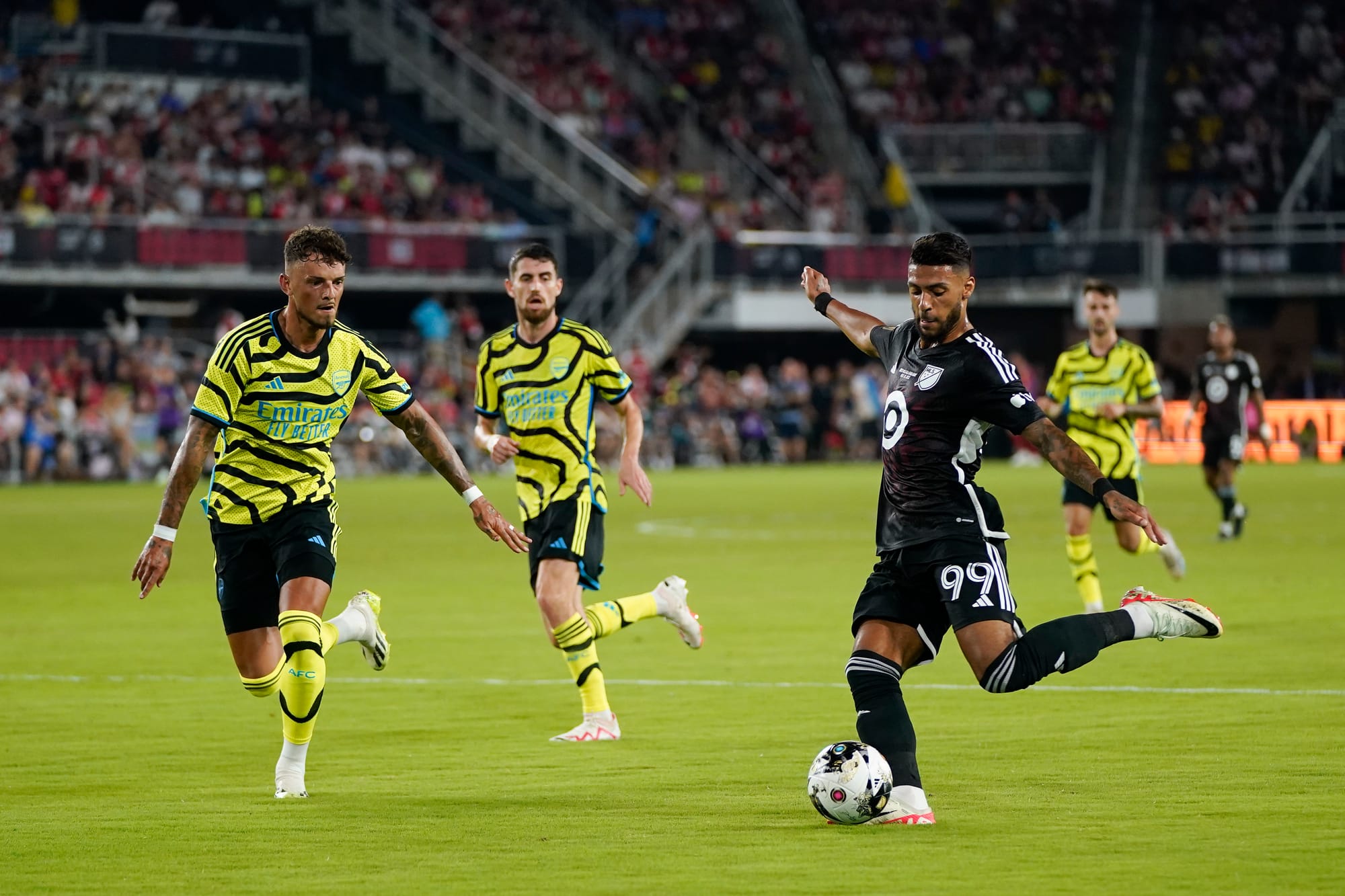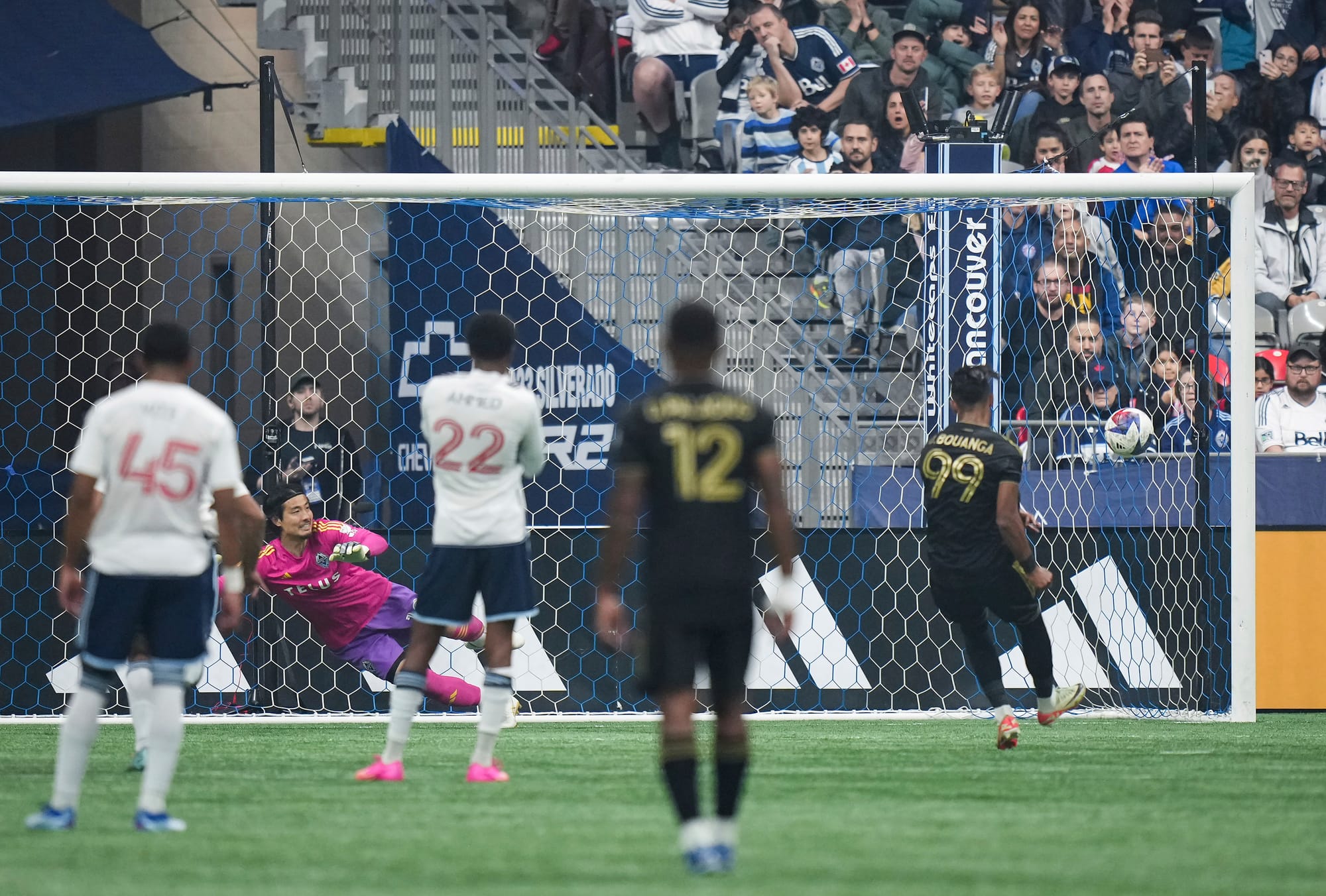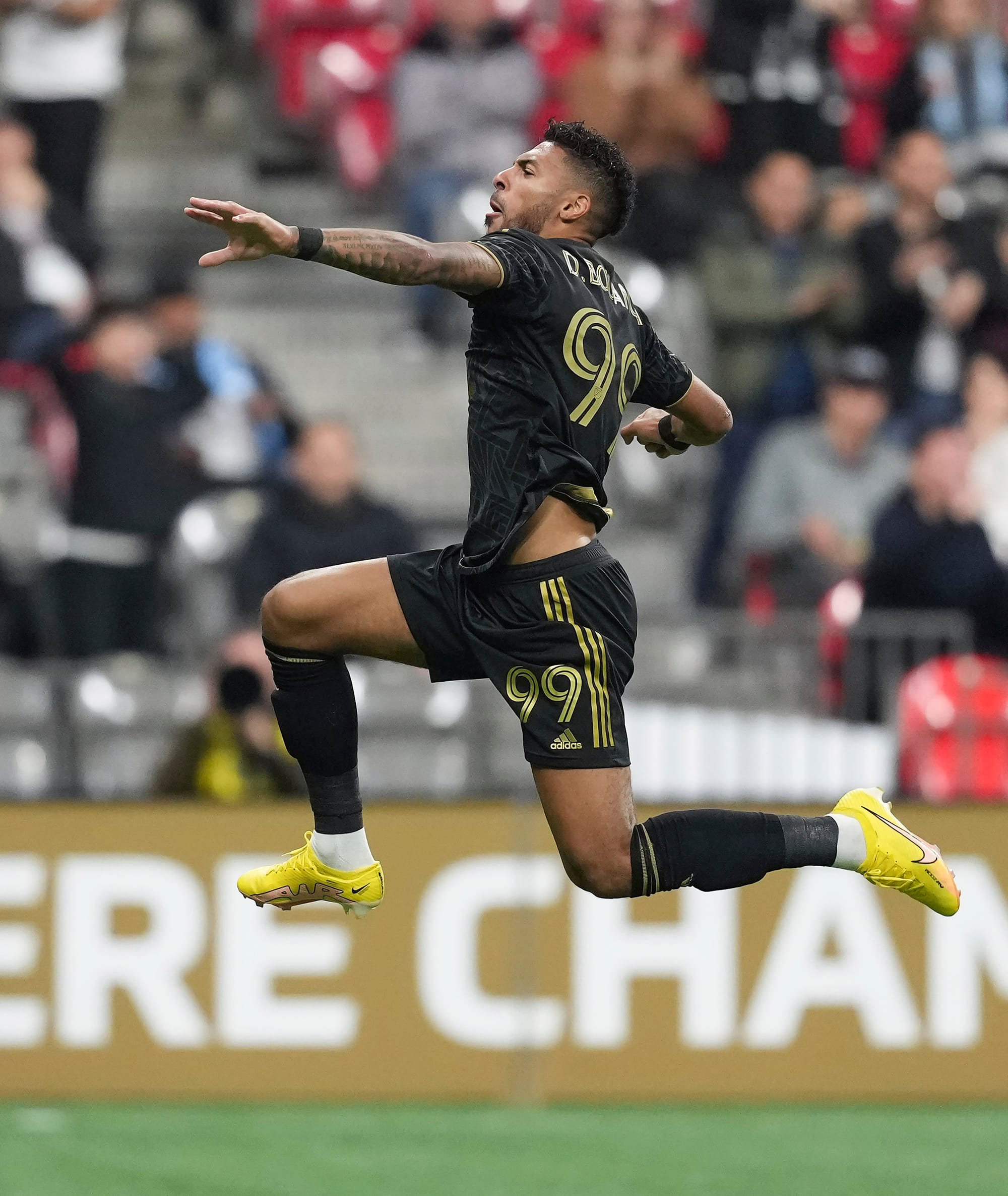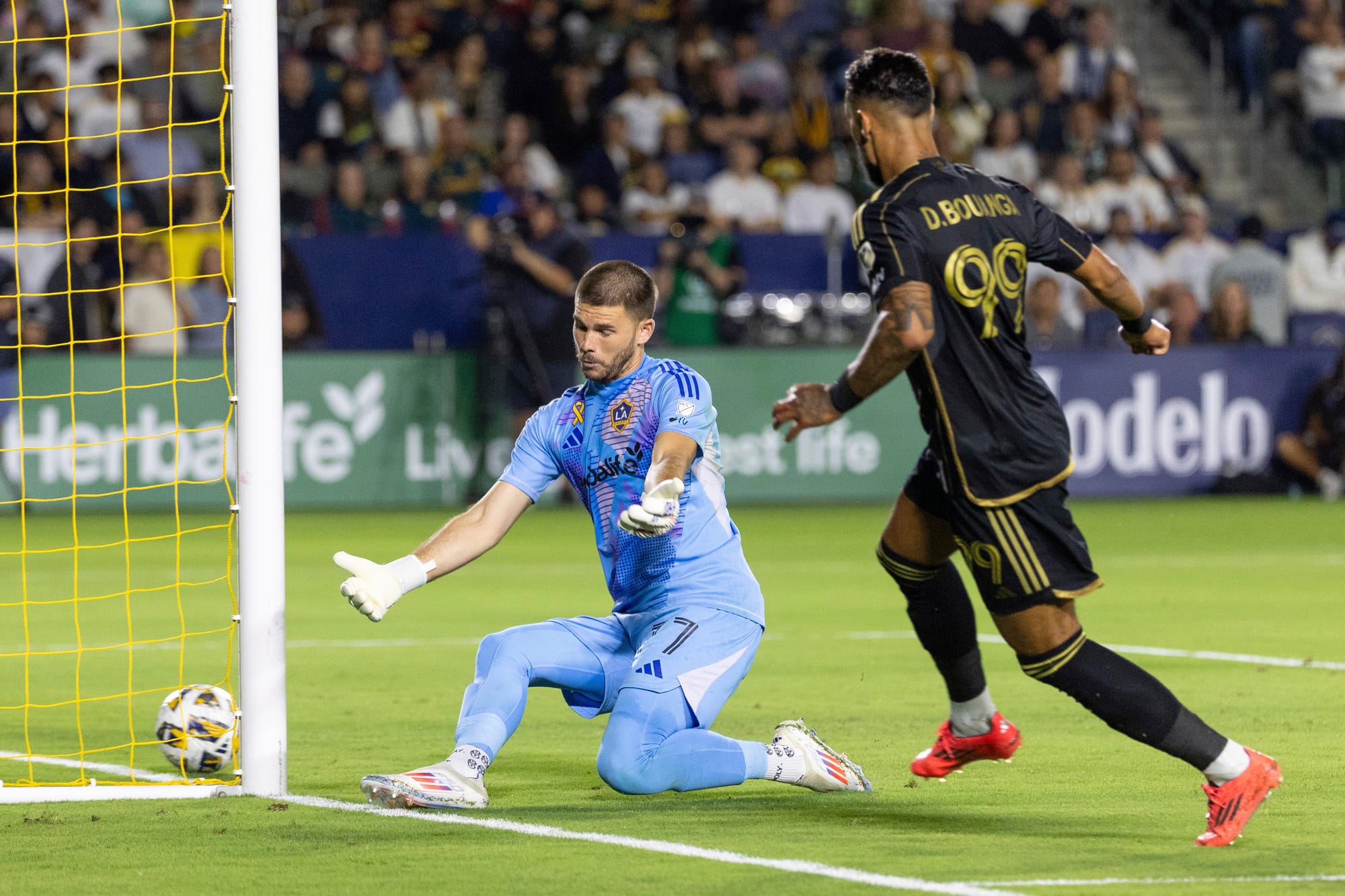
It’s an hour before kickoff and a golden band of light colors the upper rows of BMO Stadium in Los Angeles. Sprinklers nourish the playing surface; the texture repeatable and refined. Colored cones mark traffic patterns for athletes warming up in front of the black- and gold-clad fans scattered across a sea of battleship gray seats.
Team flags hang impotent behind the net, awaiting the jolt of lightning from supporters. Goalkeepers are having a solitary warmup, passing the ball across the damp surface. Right foot to right foot, left foot to left foot as the guest DJ pumps the jams and the LA skyline glitters in sunset hues of bronze and pink.
The pre-game show is Hollywood-inspired, sharply edited to a deafening soundtrack and seizure-inducing light show. And as the 11 players from LAFC take the pitch, number 99 is doing his thing.
Just before the match begins, his arms swing wildly toward the heavens, encouraging the crowd to make some noise. Sprinting in his space along the left sideline, his pink cleats are a cotton candy blur against the manicured turf.
Fans behind the goal are ignited, flags waving, smoke bombs uncorked, casting a medieval haze under the stadium lights. The beat of the drums, the throaty, melodic terrace chants — the stadium has come alive. And so, too, has one of the league’s most electrifying talents.


Bouanga's offensive talents are no joke. He won the Golden Boot as the league's top scorer in '23. [AP photos]
At 4:00, Dénis Bouanga receives a deft pass that gives him a scoring chance. He misses high and wide and pulls up limping but shakes it off.
He’s racing to the middle at 12:49, seeking to break a seam. He’s created three scoring chances so far, effortlessly slicing through traffic, looking for passes at peak speed to rupture the defenders. He is dangerous and thrilling, bringing fans to their feet as they react with audible exasperation at each missed opportunity.
In the second half, he becomes a creator, heading a ball into open space, his teammate running for it, the attack now dangerous as Dénis fills the middle. Later, he’s inside the box, a glorious chance angled wide off his foot.
This is a talent built for LA. He’s handsome. He’s a showman with his aerial flips for goal celebrations. His speed and skill and scoring touch is bewitching.
So how did this French-born dynamo escape the big clubs in Europe? The answer is patience, fortune and determination.
Dénis grew up in LeMans, France. Yes, that LeMans. Home of the famed 24 Hours of LeMans race notably exalted in recent Hollywood films by directors James Mangold (Ford vs Ferrari) and Michael Mann (Ferrari).
Speed. Endurance. Skill. Luck.
All required ingredients to win the lauded, 101-year-old classic. Conversely, the same ingredients could apply to professional soccer players. Those racing skills must have seeped into the groundwater, absorbed by Dénis’s family across town, despite having never seen the spectacle in person.
“There was not a passion when I was a kid,” Dénis says of the 24 Heueres du Mans. “Now, I love a nice car. I love speed. Not on the (racing) circuit, but on the road.”
Through an interpreter, Dénis says he doesn’t regard his hometown as the glamorous host of the world’s iconic auto endurance race. Instead, his neighborhood was void of polish.

“I come from a tough neighborhood. Soccer was a way to succeed. I’m happy about this, my childhood, it strengthened me mentally. It made me who I am. Thanks to that childhood, me and my siblings became who we are now. There were highs and lows, but at the end of the day, it made us who we are.”
The brothers are a genetic wonder, with all three becoming high-caliber athletes.
There’s Dénis, of course — a professional footballer with Major League Soccer’s LAFC. There’s older brother Cédric Mansaré, who inspired Dénis to pursue football and became a professional basketball player in France. Younger brother Didier, also instrumental in his story, is a professional footballer as well, having bounced around various leagues within the French pyramid.
Their father, Améde, played soccer at a high level, although not professionally. But he set the bar for his family.
“His education was about sport, he gave us the desire and the framework to evolve in sports, and that’s thanks to him.
“When I was young I was playing soccer all the time. With my older brother, I did physical preparation with him, like all the running, he took me with him for that. But I was all the time with my younger brother and playing soccer, definitely thanks to him that I became the soccer player that I am.”
It wasn’t always a foregone conclusion that this Golden Boot winner, this MLS champion whose speed and dribbling and graceful attacks look like some sci-fi spawn of Usain Bolt and Fred Astaire, would reach stardom.
And yet, when viewed with a modern-day lens, it’s a wonder this was ever questioned.
In a recent loss to cross-town rival LA Galaxy, Dénis scored a breathtaking goal, sprinting down the left wing with enough velocity to visibly freak out the defender, his ball skills sublime, mesmerizing and reminiscent of another Los Angeles legend — Magic Johnson — and his finishing so deft, so deceitful and so delicate with finesse and touch and panache, the finest French pastry chefs would blush.

He’s living proof why giving up on your dreams is the easy way out. As a youngster, he was small, wiry and lacked focus. Dénis was denied acceptance to the coveted sport school in sixth grade. This doubt that was cast upon him so early had an impact that he carries with him today.
“I was refused entry not due to my sports or athletic skills, but for me, it was for my behavior. So I had to do the work and I was finally accepted in ninth grade.”
Even then, as a member of U-19 LeMans FC, he found his path to a regular role on the pitch blocked. He continued to put forward his best effort, honing his craft, learning to play without the ball, working on his mental game. But the “academy” products were always deemed more worthy of playing time.
“I was training with them but I never played a game with them. That strengthened my determination to become a professional athlete. It made me more aggressive.”
Eventually, he decided it was time to move on. Younger brother Didier, who was playing for regional club AS Mulsanné-Teloché, encouraged him to join his team, where Dénis says he began to flourish under coaches who were nurturing.
“They took me and told me the message which was ‘We take you for your value, what you are’ and I felt good in that. That was the moment it clicked for me.”
This is where digging in — rather than retreating — paid dividends for both brothers. Soon they were lacing their cleats to play for FC Lorient in France’s top tier, Ligue 1. Ever gracious, he credits Didier for this, as it was his brother the FC Lorient staff came to scout.

And yet he couldn’t rest easy, despite the well-earned promotion. Feeling overlooked again, he was loaned to second and third-level clubs, bouncing around the pyramid. All the while, he continued producing goals and assists, letting his natural ability do the talking. This earned him another go in Ligue 1, first with Nîmes before signing with storied club AS Saint-Étienne in 2019.
While it finally seemed like Dénis had arrived at the top levels of professional soccer in France, there was a series of events he couldn’t control.
Within two years of his arrival at ASSE, the club was fighting for its Ligue 1 life in a relegation campaign that ended violently in 2022. Following a loss on home turf that sealed the club’s fate, angry fans rushed the pitch, creating a violent, terrifying scene that marred soccer’s image internationally and put the club in a position where it may never see Ligue 1 again due to sanctions.
Dénis told European outlets at the time that the experience affected him in ways he didn’t expect. This time, it was his decision to leave.
Los Angeles has a complicated history with professional sports. The Kings are the OG — established in 1967 and the first local team actually birthed here. The Dodgers moved from Brooklyn and the Lakers from Minneapolis. The latter two feel homegrown thanks to the passage of time and the winning of championships. But the others resemble the majority of the population — interlopers from somewhere else. The Rams (St. Louis), Chargers (San Diego), Clippers (Buffalo, San Diego) and Angels (who have never left Anaheim but pretend to be in Los Angeles). The Raiders (Oakland, Las Vegas) came and left.
So when Major League Soccer set up shop in LA, nobody knew what to expect. LA Galaxy was first in 1994, followed by Chivas in 2005. When Chivas folded in 2014, LAFC was the new kid in town and played its first match in 2018.
MLS had already emerged as an option for top European talent, thanks largely to English sensation David Beckham, who signed with LA Galaxy in 2007.
Dénis admits that when LAFC approached him two years ago, “it’s true that it wasn’t my first choice.” But having been let down time and again by those he’d given his heart to, maybe this would be different.
Management’s persistent pursuit of the tantalizing talent turned the tide.
“They convinced me and it’s true that to live in LA was awaiting my decision and as I say all the time I have no regret.”

Months after arriving, LAFC won the league championship. Without Dénis, it’s fair to say this would have been more difficult. In a pivotal playoff match against their cross-town rivals, he scored two goals and set up the winner, eliminating LA Galaxy and propelling LAFC into the Western Conference Finals.
Two weeks later, after eliminating Austin in the conference finals, he was first to score in the penalty shootout as his club was deadlocked with Philadelphia Union after 120 minutes, eventually taking home the championship on penalty kicks.
He won the Golden Boot as the league’s top scorer the following season, where he also earned MLS All-Star honors and was an MVP Finalist. The club awarded him with a two-year contract extension, keeping the electrifying scorer in Black and Gold through the 2027 season with a team option for 2028.
Although he’s often the subject of rumors that have him returning to Europe, Dénis says he’s happy in Los Angeles, and with the quality of talent in the league.
“Every year the level is increasing. A lot of players want to come. (Lionel) Messi joining the MLS definitely enhanced that. It is going to increase the level and there will definitely be more after the World Cup (the U.S. is a host country in 2026).”
Dénis, his partner Maella, and their two children, Kaaïs and Nakïya, have fallen in love with Southern California. With a good contract, star status and an affinity for fashion and la belle vie, it’s hard to beat Los Angeles.
“They love it here,” Dénis says. “They love it so much that they are not willing to go back to live in France.”
Moving to the U.S. wasn’t without its challenges, though. Dénis confesses it was hard to leave his parents, and the language barrier can be intimidating — he does understand and can speak some English.
“The personal part was the biggest challenge. At the end of the day, you give me a soccer ball and some shoes, I won’t complain. Soccer remains soccer.”

His confidence is soaring as LAFC looks to make another title run. [AP photo]
As for his time away from the pitch, it’s all about family.
“First I have to play some soccer with my son at least once a day. We love dinner at nice restaurants. Walking on the beach. To be with my family, doing this activity with the sunny weather, exploring new places.”
This includes finding room on those clogged LA arteries to hear the turbos whine and feel the acceleration beneath him — where he quenches that need for speed. When challenged how he can drive full throttle to his satisfaction given the traffic here, Dénis smiles shyly.
“I find in the mornings that when you have a six-lane highway, sometimes you have the opportunity to push it a little bit. It’s a sports car. So, you know, sometimes I push it to just enjoy the car.”
Of course. He disappears into a blissful scene that captures California’s essence but also could describe him on the pitch: speed, space, glorious light and the wind in your face.